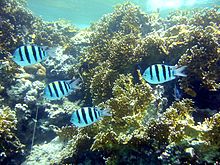Indo-Pacific sergeant
| Indo-Pacific sergeant | |
|---|---|

| |
| Scientific classification | |
| Domain: | Eukaryota |
| Kingdom: | Animalia |
| Phylum: | Chordata |
| Class: | Actinopterygii |
| Order: | Blenniiformes |
| Family: | Pomacentridae |
| Genus: | Abudefduf |
| Species: | A. vaigiensis
|
| Binomial name | |
| Abudefduf vaigiensis | |
| Synonyms[3] | |
The Indo-Pacific sergeant (Abudefduf vaigiensis) is a species of damselfish in the family Pomacentridae. It may also be known as the Sergeant major although this name is usually reserved for the closely related species Abudefduf saxatilis. The closely related Abudefduf caudobimaculatus was formerly considered to be synonymous with this species and, according to some authorities, is synonymous.[4][5]
Distribution
[edit]
The Indo-Pacific sergeant is found in the Indo-Pacific including the Red Sea.[6] Indian Ocean populations are found in the Red Sea, the Gulf of Aden, Arabia, the Persian Gulf, the Arabian Sea, the Maldives, eastern Africa, Tanzania, Madagascar, Seychelles, Sri Lanka, the Andaman Sea, Indonesia, Malaysia, and Australia.[6] Populations in the Pacific Ocean are found in the Gulf of Thailand, Malaysia, Indonesia, the Philippines, Taiwan, Japan, the Yellow Sea, the Great Barrier Reef around Australia, New Zealand, and Pacific islands all the way to Hawaii.[6] Likely introduced via Suez Canal[7] in the Mediterranean Sea, where its distribution remains unclear due to possible confusion with Abudefduf saxatilis and Abudefduf troschelii.[8]
Description
[edit]Abudefduf vaigiensis are white bluish with a yellow top. They have a black spot around their dorsal fin. It has yellow eyes. The dorsal fin on this fish has 13 dorsal spines and 11 to 14 dorsal soft rays.[6] The anal fin on the Indo-Pacific sergeant has 2 anal spines and 11 to 13 anal soft rays.[6] Its maximum recorded size is 20 centimetres (7.9 in).[6] Juveniles mature at 12 centimetres (4.7 in).[6] Males turn more blue during spawning.[6] Many people confuse this fish for Abudefduf saxatilis, a closely related species found in the Atlantic Ocean.[6]
Ecology
[edit]Diet
[edit]They feed on zooplankton, benthic algae, and small invertebrates.[9]
Habitat
[edit]Adults live in coral reefs, tide pools, and rocky reefs.[6] Larva of this species live in the open sea.[6] It is found in tropical and subtropical waters. Depth ranges of 1 to 15 metres (3.3 to 49.2 ft) are where people encounter this fish.[6]
Behavior
[edit]These fish form large aggregations.[6] In the aggregations, individuals either feed in the midwater or tend their nests.[6]
In the aquarium
[edit]This fish is found in the aquarium trade.
Hazards to humans
[edit]There have been reports of ciguatera poisoning from this fish.[6]
Life Cycle
[edit]Early life
[edit]The larva hatch and drift out in to the pelagic zone.[6] They drift in the waves and grow up until they go to a reef.[6]
Breeding
[edit]Males turn more bluish during spawning.[6] They build nests on rocks or coral ledges.[6] Then, females lay their eggs in the nests and the male fertilizes them.[10] Males guard and aerate the eggs until they hatch.[10]
References
[edit]- ^ Allen, G.; Williams, J.T.; Larson, H. & Burt, J. (2017). "Abudefduf vaigiensis". IUCN Red List of Threatened Species. 2017: e.T188609A1901550. doi:10.2305/IUCN.UK.2017-2.RLTS.T188609A1901550.en. Retrieved 20 November 2021.
- ^ Allen, G.; Williams, J.T.; Larson, H. & Burt, J. (2015). "Abudefduf vaigiensis (Persian Gulf assessment)". IUCN Red List of Threatened Species. 2015: e.T188609A57211325. Retrieved 24 November 2023.
- ^ "Synonyms of Abudefduf vaigiensis (Quoy & Gaimard, 1825)". FishBase. Retrieved 4 October 2018.
- ^ Bailly, Nicolas (2023-01-10). "Abudefduf caudobimaculatus Okada & Ikeda, 1939". WoRMS. World Register of Marine Species. Retrieved 2023-11-24.
- ^ Wibowo, Kunto & Toda, Minoru & Motomura, Hiroyuki. (2017). Validity of Abudefduf caudobimaculatus Okada and Ikeda 1939 and synonymies of Abudefduf vaigiensis (Quoy and Gaimard 1825) (Perciformes: Pomacentridae). Ichthyological Research. 65. 10.1007/s10228-017-0594-3.
- ^ a b c d e f g h i j k l m n o p q r s Froese, Rainer; Pauly, Daniel (eds.). "Abudefduf vaigiensis". FishBase. May 2007 version.
- ^ Rami Tsadok; Maxim Rubin-Blum; Eli Shemesh & Dan Tchernov (2015). "On the occurrence and identification of Abudefduf saxatilis (Linnaeus, 1758) in the easternmost Mediterranean Sea" (PDF). Aquatic Invasions. 10 (1): 101–105. doi:10.3391/ai.2015.10.1.10.
- ^ Atlas of Exotic Fishes in the Mediterranean Sea (Abudefduf vaigiensis). 2nd Edition. 2021. 366p. CIESM Publishers, Paris, Monaco.https://ciesm.org/atlas/fishes_2nd_edition/Abudefduf_vaigiensis.pdf
- ^ Lieske, E. and Myers, R.F. (2004) Coral reef guide; Red Sea London, HarperCollins ISBN 0-00-715986-2
- ^ a b ""Abudefduf vaigiensis". The Encyclopedia of Life. Retrieved December 21, 2014.
Further reading
[edit]- Coleman, Richard R.; Gaither, Michelle R.; Kimokeo, Bethany (November 2014). "Large-scale introduction of the Indo-Pacific damselfish Abudefduf vaigiensis into Hawai'i promotes genetic swamping of the endemic congener A. abdominalis". Molecular Ecology. 23 (22): 5552–5565. doi:10.1111/mec.12952. PMID 25283736.
- Maruska, Karen; Peyton, Kimberly (April 2007). "Interspecific Spawning between a Recent Immigrant and an Endemic Damselfish (Pisces: Pomacentridae) in the Hawaiian Islands". Pacific Science. 61 (2): 211–221. doi:10.2984/1534-6188(2007)61[211:isbari]2.0.co;2. hdl:10125/22609.
- Tsadok, Rami; Rubin-Blum, Maxim; Shemesh, Eli; Tchernov, Dan (21 May 2014). "On the occurrence and identification of Abudefduf saxatilis (Linnaeus, 1758) in the easternmost Mediterranean Sea" (PDF). Aquatic Invasions. 10 (1): 101–105. doi:10.3391/ai.2015.10.1.10. Retrieved 29 April 2015.
External links
[edit]- Fishes of Australia : Abudefduf vaigiensis
- Photos of Indo-Pacific sergeant on Sealife Collection


